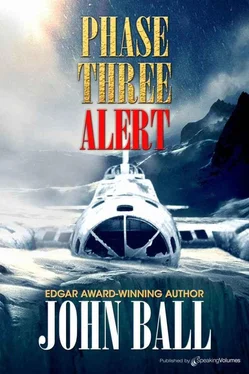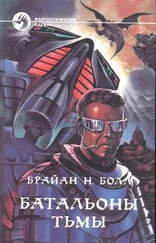Corbin came up and took over the copilot’s seat. In response Ferguson relinquished the run-in test to his partner. Corbin had a good deal of time on small piston-engined aircraft and held a civilian flight instructor’s rating. Also, he had worked like a beaver on the engine rebuilding.
After an hour and a half, Corbin shut down the engine and secured the proper controls. When he came off the flight deck there was a grin on his face that ran almost from ear to ear.
In the NCO Club that evening, Tom Collins called a meeting to which ten key invitees responded. Ferguson was there of course, and his whole crew; some of Det. 4 sat in, along with Collins, the indispensable Sergeant Feinberg, and a powerful Dane named Karsten Thorlund, who was the acknowledged head of the civilians engaged in the rebuilding project.
When the drinks had been served and everything was ready, Collins took the floor. “Gentlemen,” he began, “from the very start of this thing, we’ve been going on the very sound premise that we were going to restore the Penguin to all of her former glory, just as she was.”
“Amen,” Sergeant Stovers said over his beer.
“Now,” Tom went on, “I want to propose an exception — if we can do it. You all know how much we’re indebted to the Canadians up at Alert for overhauling the electronics for us. But there’s a big problem; the frequencies have all changed and so has the whole system of radio navigation. Everything that the Penguin has is low frequency; she can tune in all of the range legs, but there aren’t any more left.”
He waited for some response to that, but everyone else chose to remain quiet. He was right and they all knew it; a new electronic age had been born since the bomber had been abandoned on the ice cap.
Tom continued. “We’re going to fly her, of course, and when the story gets out about what’s been done here, I suspect that the Penguin is going to be one of the most famous planes in the world. She’s going to have to go to a lot of different places and make personal appearances; you guys all remember the Navy’s Truculent Turtle and how much mileage they got out of her.”
“Definitely,” Sergeant Feinberg said.
“So baby is going to have to have some modern electronics; without them she won’t be able to communicate.”
“Looking at it that way,” Ferguson said, thinking aloud, “she’s going to need, at the very least, dual OMNI, TACAN with DME, in all probability single sideband since she’s long-legged with more than a four-thousand-mile range, and at least one transponder: she’s got to be able to squawk.”
“All of which adds up to about thirty grand even without the VORTAC,” Corbin declared. “And none of that gear is surplus.”
“First,” Thorlund interjected in a rich baritone, “we have to decide if we want to install modern electronics or not.”
There was some discussion in response, but even the die-hard traditionalists had to concede that a four-engined aircraft equipped with radios that no one could hear and that were unable to receive any current communications would be hopelessly handicapped. “She’d never be able to file IFR,” Collins summed up, “and that’s grossly beneath her dignity, if nothing else.”
“We have to do it,” Corbin said. “I’ve been thinking the same thing, but I didn’t want to rock the boat.”
“How about the radios we have?” Stovers asked.
Ferguson answered him. “Anything she can use she keeps. Otherwise…”
“Has anybody got any ideas?” Holcomb asked.
In the thick silence that followed not even Sergeant Perry Feinberg was able to come up with a suggestion. He was, however, thinking. “Since she’s out of the Air Force inventory,” he said, “we can’t draw the gear in the usual way.”
“Isn’t there a crashed airplane somewhere between here and Alert?” Tiny Heneveld of Det. 4 asked.
“Yes,” Corbin answered. “I’ve heard about it. But that stuff has been through an honest-to-gosh crash and it won’t be worth an empty pea pod. You can throw it into the chop suey, and that’s all.”
“Not quite,” Mike Turner said.
“Expound,” Perry Feinberg invited.
“Simple: when you’ve got a piece of radio gear that doesn’t work, you turn it in to be fixed. If they can’t fix it, they issue you a new one.”
Chief Master Sergeant Feinberg sat stock still while a dawning light crossed his broad face, then he turned slowly and looked at the young helicopter pilot with new respect and possibly a certain amount of awe. “Do you realize what you have just done?” he asked. “You have forever settled a question that has confronted the Air Force since its inception. You have, at this sacred moment, proven for all time the indisputable worth and value of second lieutenants. It is a monumental event-and to think that I am present here to witness it!”
“How will we get the sets?” Corbin asked.
“Difficult, but possible,” Feinberg answered. “If all else fails, I have Eskimo friends and they, in turn, have dog teams. Something will be worked out.”
On the first day that the sun remained above the horizon long enough to give adequate daylight at midnight, the number two engine was successfully tested. With two power plants available, Ferguson made a ground phone call to the tower and then, armed with the necessary permission, he taxied the Penguin to the end of the runway and ran up. When he was satisfied, he turned as if for takeoff, started down the 10,000-foot strip and ran for over a mile at fifty knots with the tail lifted into flying position. It was the most exciting ride he had ever had; only by the exercise of great willpower did he keep himself from pushing the throttles all the way forward to see if she would come off the ground. She was empty of any payload and while she was shy some 2,400 horsepower, she was also relieved of some 5,000 pounds of engine weight. Probably she would have been able to do it, but the time was not yet.
When he went to bed that night, Ferguson lay on his back and looked up at the ceiling, his mind churning and his body actively resisting any approach of sleep. He was, at that moment, in love, and the object of his affections was not a young woman, but a machine.
Even at minimum wage scales, the amount of work that had already gone into the rebuilding of the Penguin represented far more than the aircraft itself could possibly be worth — that is, if she were to be considered as so much aluminum, so many thousands of rivets, so many miles of wiring, so many pounds of various fluids, so much rubber, and so many other ingredients. But it was impossible for him to think of her that way. Skilled pilot that he was, he had never known any airplane as well as he knew that B-17 and the whole, to him, was vastly greater than the sum of the parts.
He recalled reading about a railroad engineer who, upon his retirement, had asked to buy the locomotive that had been his constant working partner for thirty years. Because steam power was going out anyway, the railroad had given him the engine. Together with his friends, the engineer had laid two miles of temporary track, from the railroad yards to his home. On a great day in his life he had driven the engine for the last time, over the impromptu rails and onto the side yard of his property. During his retirement his familiar iron friend was his faithful companion. It, too, took up a new career and became an enormous attraction for all of the neighborhood children.
A week later the original nose insignia of The Passionate Penguin had been repainted in brilliant fresh colors. The third engine was ready to be reinstalled and tested and most of the instruments were entirely overhauled and certified accurate. The C-130 Hercules made a trip to Anchorage, Alaska, for some essential maintenance; Captain Boyd and his crew took her almost literally across the pole on a long nonstop flight plan that covered some of the most desolate parts of the globe. In order to at least give the appearance of doing something officially useful, Scott Ferguson spent considerable time in the Det. 4 hangar familiarizing himself with the HH-3 helicopter. He made two trips to the Eskimo village of Kanak and enjoyed every moment of both experiences.
Читать дальше












